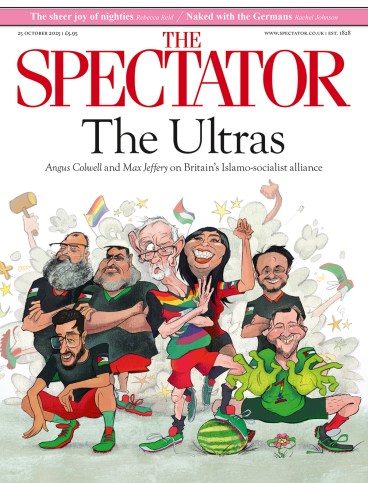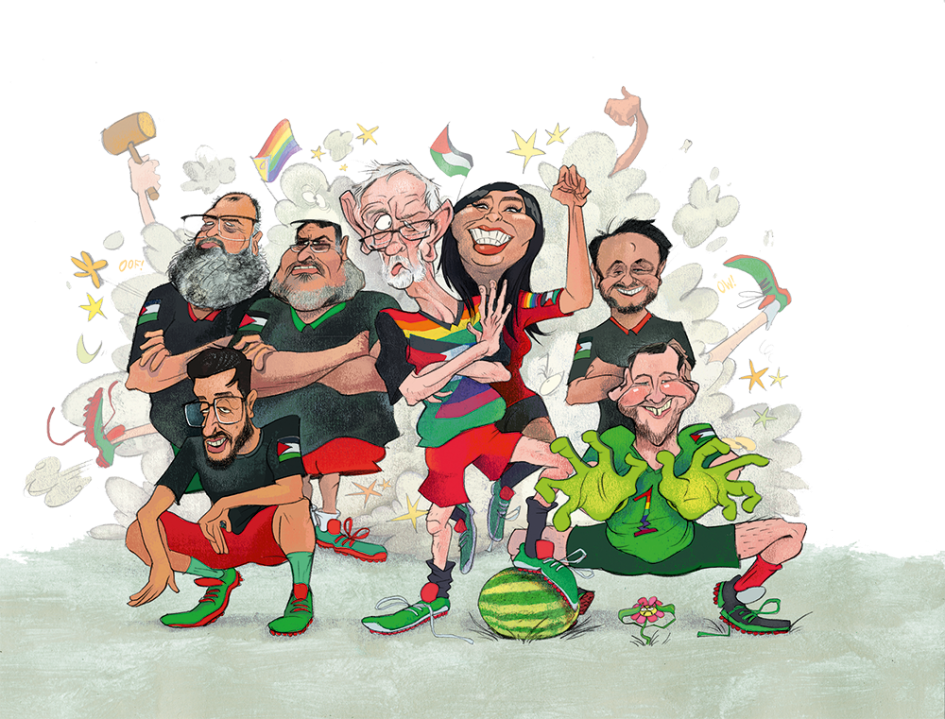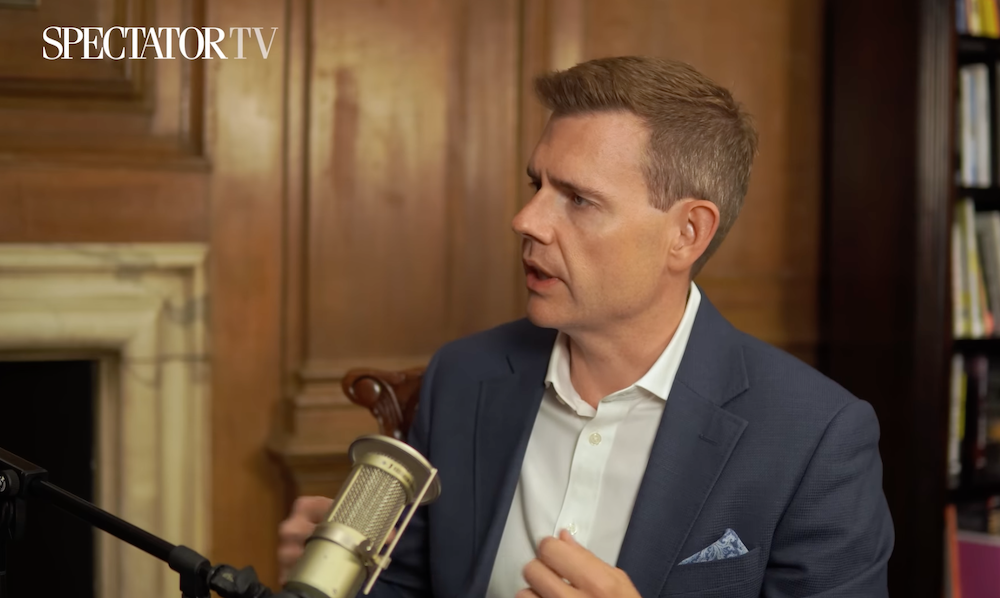
Max Jeffery has narrated this article for you to listen to.
Ayoub Khan seemed delighted. Last Thursday, it was announced that fans of the Israeli football club Maccabi Tel Aviv would be banned from attending their match against Aston Villa next month, an outcome that Khan, the MP for Birmingham Perry Barr, had been lobbying for since September. That night, Khan took himself on a broadcast round to celebrate. Keir Starmer had said the ban was the ‘wrong decision’, but on Newsnight Khan told him to back off. ‘The Prime Minister should stay out of operational matters,’ he said. ‘That’s not a matter for him, sitting in No. 10.’
It has been a satisfying 15 months for Khan since his election. Last year, he and three other independent candidates (Adnan Hussain in Blackburn, Iqbal Mohamed in Dewsbury and Batley, and Shockat Adam in Leicester South) unexpectedly won seats as the Muslim vote deserted Labour over Israel’s war in Gaza. The four MPs have since allied themselves with Jeremy Corbyn and Zarah Sultana, the co-leaders of Your Party, formalising a quixotic alliance of anti-capitalists, environmentalists, Muslim voters and trans activists. Supporters think this new coalition could win 50 seats at the next general election. It would be the biggest hard-left presence in parliament’s history.
The Spectator has spoken to aides, parliamentarians, former ministers and government officials about this new alliance and the politics it represents. A single truth emerges: whatever Westminster tries to do about it, MPs like Khan are not going away.
The election campaigns of the Gaza independents were some of the most intense in British history. When a dripping wet Rishi Sunak called the election outside No. 10 last year, the Tories were already dead. Starmer had an easy ride to power, and few paid attention to what was happening in Labour’s safe urban seats. In Leicester South, for example, Jonathan Ashworth was left to fight a fraught campaign against Shockat Adam, a Malawi-born local from an Indian Gujarati Muslim family. Ashworth was assailed for abstaining on a vote calling for a ceasefire in Gaza in November 2023, branded ‘Genocide Jon’, and harassed in the streets by groups of men. His Muslim supporters were ordered by community leaders to remove pro-Labour posters from their windows. Many have claimed these attacks were done in Adam’s name. He denies this.
The nadir for Ashworth came two weeks before polling day, when he was campaigning by Spinney Hill Park in his constituency. He was confronted by a group of men, including Majid Freeman, a Muslim activist who shortly afterwards would be jailed for five months for instigating violence against Hindus during the riots in Leicester in 2022. The group followed Ashworth and shouted that he had the ‘blood of Palestinian men, women and children’ on his hands; he sought refuge from the men in a vicarage. ‘If you don’t want to be asked questions by the public when you are canvassing on our streets, then maybe you should just stay at home?’ tweeted Adam after the incident.
Other Labour incumbents, including Khalid Mahmood, Shabana Mahmood and Jess Phillips, were challenged by independent candidates in 2024. They also claim they faced intimidatory tactics during the campaign (there was a campaign of intimidation ‘geared against me from the start’, says Khalid Mahmood, who lost his seat to Ayoub Khan); but all of their opponents again deny involvement. Shabana Mahmood and Phillips held their seats.
Jeremy Corbyn had become an irrelevance, but after the 7 October attacks he was reinvigorated
The government know full well the details of what happened last year. A week after the election, on 12 July, John Woodcock, who was then the government’s adviser on political violence and disruption, sent a six-page memo to Yvette Cooper (then home secretary), copying in Dan Jarvis (security minister) and Michael Stewart (then director of Prevent, the UK’s counter-extremism programme). He outlined the abuse suffered by eight prospective MPs during the election – ‘car tyres slashed’, ‘masked men’, ‘faeces’ – and offered to conduct ‘a focused piece of work on the scale and drivers of this intimidation’. His proposal went unresolved.
Once in the Commons, sitting in the naughty corner behind Reform, the Gaza independents made a new friend in Jeremy Corbyn. For three years after resigning as Labour leader, Corbyn had been an irrelevance, but after the 7 October attacks in 2023 he was reinvigorated. Within a week of Hamas’s massacre he was addressing rallies against Israel’s response. On Armistice Day, Corbyn accompanied some 300,000 people from Hyde Park to the US embassy in one of the biggest marches since the Iraq war. He was team captain again.

It was in this context, as a man on the rise, that Corbyn decided to start a pro-Gaza political party after the 2024 general election. Talks between Corbyn and the Gaza independents began in Portcullis House soon after the result, and continued over Zoom during that summer’s parliamentary recess. On 2 September, the ‘Independent Alliance’ was announced. The quintet could now share resources and money. They hoped their grouping would permit them more parliamentary time during questions and debates.
Conversations quickly moved on to the question of expansion. Jamie Driscoll, the socialist former mayor of North of Tyne, who was hounded out of the Labour party during one of Keir Starmer’s purges, was drafted in to fundraise and to formalise the grouping’s financial structures. Karie Murphy, Corbyn’s chief-of-staff when he led Labour, got involved too. Talks then began with Zarah Sultana, the Labour MP for Coventry South, about a defection. Sultana had lost the Labour whip less than three weeks after the 2024 election, for voting to scrap the two-child benefit cap. She was promised that she could be co-leader with Corbyn.
Sultana joined, and Karie Murphy and her allies entered into factional warfare against her. Team Murphy wanted Corbyn to be the group’s only leader, and at an online meeting in June this year, they tried to move against Sultana. Alan Gibbons, an independent councillor in Liverpool and a friend of Murphy’s, tabled a proposal to put Corbyn in sole charge. The scheming backfired, and the organising committee ended up approving a rival proposal which cemented Sultana’s position as co-leader.
Murphy’s presence has continued to upset people. She largely manages the party day-to-day, since Corbyn is late to meetings, indecisive, and often doesn’t reply to emails. A source close to the Gaza independents (who does not want to be named because ‘it is well-documented that Karie seeks [political] reprisals’) says she is ‘a very divisive figure’ who ‘has a habit of putting people off’.
The source adds: ‘She has professed she just wants to get this thing off the ground and then she wants to retire. My personal view is that she wants her old job back. She wants another attempt at running the show.’
With Corbyn and Sultana bickering about who really runs Your Party, the Gaza independents have been lying low. As Your Party’s policies are being drafted at ‘regional assemblies’ ahead of its founding conference next month, it is becoming clear to members that the Gaza MPs are not socialists. All four of them voted against putting VAT on private schools – a key issue in the Sikh communities these MPs also court – and two of them are landlords. None of the four, it is safe to say, is particularly woke. ‘The Gaza MPs hate Sultana,’ a source says. ‘She’s a woman, and she will talk about trans rights. That won’t be their priority.’ Your Party officials have put pressure on the Gaza independents to sell their rented properties.
It is becoming clear that the Gaza MPs are not socialists. None of them, it is safe to say, is woke
Ideological inconsistencies, however, will be glossed over. A powerful electoral alliance has been born between young progressives and a group of Muslim voters. Your Party and the Greens, now led by the self-declared ‘eco-populist’ Zack Polanski and his deputy Mothin Ali, who once called a rabbi an ‘animal’ for being a reservist in the Israeli military, are already in talks to have an electoral pact, where whoever looks most likely to win the seat will run unopposed. In this venture they will be aided by an organisation called Muslim Vote, which helped the Gaza independents at the last election. For 2029, Muslim Vote has offered to supply the Greens and Your Party with data on the voting preferences of local Muslims in each constituency.
Labour will be the party most damaged by these tactics. Despite a notional peace deal now in place in Gaza, the party’s traditional Muslim vote is unlikely to return. Crucially, a disproportionate number of the cabinet are in seats with a high Muslim population. Wes Streeting, in Ilford, is the most obvious example, with a majority of just 528 after the independent Leanne Mohammad ran him extraordinarily close in 2024. A source close to Ayoub Khan says he is likely to stand again at the next election.
Some in government fear sectarianism hardening and characters like Majid Freeman becoming more prominent in Britain’s politics. There is often a lack of will from Labour ministers to confront the challenge.
Comparisons are often drawn with France, which has been more proactive at dealing with Islamism. Following the murder of the teacher Samuel Paty in 2020, the French government began a crackdown on the Muslim Brotherhood’s influence, which was supported across the political spectrum.
There are rumours that the government is rehauling its counter-extremism policies, particularly after the Manchester synagogue attack. Robin Simcox’s replacement as commissioner for countering extremism has yet to be named, with one senior source suggesting things are ‘on pause’ since that attack. Aside from a 2015 initiative that fizzled out, the Home Office has been hesitant about developing a proper counter-extremism strategy – officials say that the department’s priority was to stop terrorist attacks – but some think that a French-style crackdown on political and radical Islamism is being planned. Civil servants are worried that pushing radical groups underground could have lethal consequences, though. There are those who suggest the work could be done more softly by the Ministry for Housing and Communities, through a social cohesion taskforce. Either way, the work will be low-key. Sources suggest the government is unlikely to want a media blitz, or a Spectator cover story. A Home Office spokesperson said: ‘All forms of religious, ethnic and racial hatred have absolutely no place in our society. We are working with partners and across government to tackle the threat and respond to growing and changing patterns of extremism across the UK, ensuring we have the tools and powers to keep people safe.’
Any such strategy will have been sanctioned by No. 10. Starmer’s appointment of new ministers at the Home Office and Communities over summer was a statement of intent. As one senior source said: ‘Nothing really happened with Yvette Cooper as home secretary and Angela Rayner as communities secretary. I think it will now be a live issue with Shabana Mahmood and Steve Reed.’
Westminster has talked endlessly, in apocalyptic tones, about the rising menace on the right, the carnage that Reform will wreak on the establishment. Yet the coming alliance on the left is every bit as dangerous. All eyes are on Nigel Farage and his gang, who have begun to look quite smug on their green benches in the corner of the chamber. People should be paying just as much attention to who sits behind them.









Comments